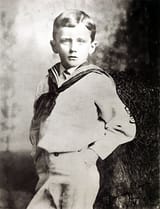Search Results
7/12/2025, 3:12:24 AM
I
In three sections. The first section is vague impressionistic childhood memories. A moment later, he's shipped off to school, cruelly separated from his parents. Some kid pushes him into a ditch, he gets sick, and he spends time in the infirmary. He does NOT tattle, or "peach" on the fellow who did it, as his father advised him not to. This probably works out to his advantage, he's a regular guy now. There is a rhythm of going off to school for a semester, then going back home for a bit, and this will repeat over years.
Second section: political argument around Christmas (not Thanksgiving, that's for Americans) turkey. (Turkeys were imported to Ireland???) Legible for an American reader. Stephen's dad and one or two other guys defend Parnell, Dante is the crazy aunt (initially seemed cool) who blindly supports the priests. The point here (as far as I'm concerned, at least) is that Stephen's dad has a moral sense which is not blindly tied to the structure of the church.
Third section: back at school. Some intrigue about other, older boys. One suggests that some homosexual activity has occurred, and so either expulsion or flogging will be meted out as punishment. At first it seems like this horrible punishment will happen to others, who may deserve it (they don't). A short time later beatings are administered to the younger boys themselves, who also do not deserve it. One other fellow and Stephen are wrongfully beaten on the palms of their hands by one capricious asshole. Like dad, Stephen is gaining intrinsic, objective-and-subjective, private knowledge that what was done to him was just plain wrong. Priests are human beings, and fallible (Dante doesn't understand this, now Stephen and his dad both do). Try to appeal to a higher authority, in this case, the rector. He is encouraged by all other boys, who saw the wrong done and all its context. He plucks up his courage, enters the rector's office and gets a friendly assurance that the guy who did the beating will be spoken to, and that seems to work. The rector DOES give the guy the benefit of the doubt "oh it must have been a mistake", which should naturally disgust the reader, but the simple fact that Stephen found courage to make the report at all and that it was received well with an (initial) acceptable outcome is the point. On the yard, the other boys ask excitedly and are pleased with the outcome. It is not clear just now whether the intended outcome actually sticks, but Stephen also wisely resolves not to be haughty around the guy either.
Irony: Stephen has "peached" (tattled) on a fellow, just not one of his peers, but a teacher/superior. One difference here is that it was witnessed by several others, so there is that.
In three sections. The first section is vague impressionistic childhood memories. A moment later, he's shipped off to school, cruelly separated from his parents. Some kid pushes him into a ditch, he gets sick, and he spends time in the infirmary. He does NOT tattle, or "peach" on the fellow who did it, as his father advised him not to. This probably works out to his advantage, he's a regular guy now. There is a rhythm of going off to school for a semester, then going back home for a bit, and this will repeat over years.
Second section: political argument around Christmas (not Thanksgiving, that's for Americans) turkey. (Turkeys were imported to Ireland???) Legible for an American reader. Stephen's dad and one or two other guys defend Parnell, Dante is the crazy aunt (initially seemed cool) who blindly supports the priests. The point here (as far as I'm concerned, at least) is that Stephen's dad has a moral sense which is not blindly tied to the structure of the church.
Third section: back at school. Some intrigue about other, older boys. One suggests that some homosexual activity has occurred, and so either expulsion or flogging will be meted out as punishment. At first it seems like this horrible punishment will happen to others, who may deserve it (they don't). A short time later beatings are administered to the younger boys themselves, who also do not deserve it. One other fellow and Stephen are wrongfully beaten on the palms of their hands by one capricious asshole. Like dad, Stephen is gaining intrinsic, objective-and-subjective, private knowledge that what was done to him was just plain wrong. Priests are human beings, and fallible (Dante doesn't understand this, now Stephen and his dad both do). Try to appeal to a higher authority, in this case, the rector. He is encouraged by all other boys, who saw the wrong done and all its context. He plucks up his courage, enters the rector's office and gets a friendly assurance that the guy who did the beating will be spoken to, and that seems to work. The rector DOES give the guy the benefit of the doubt "oh it must have been a mistake", which should naturally disgust the reader, but the simple fact that Stephen found courage to make the report at all and that it was received well with an (initial) acceptable outcome is the point. On the yard, the other boys ask excitedly and are pleased with the outcome. It is not clear just now whether the intended outcome actually sticks, but Stephen also wisely resolves not to be haughty around the guy either.
Irony: Stephen has "peached" (tattled) on a fellow, just not one of his peers, but a teacher/superior. One difference here is that it was witnessed by several others, so there is that.
Page 1
